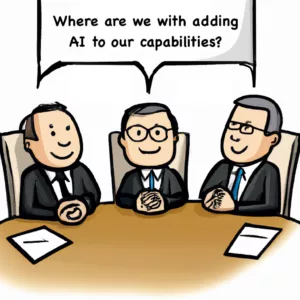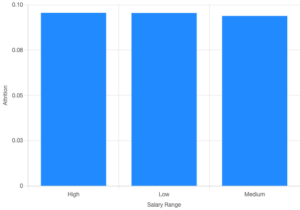Envision a future where the burdens of routine administrative tasks are lifted from the shoulders of HR professionals, enabling them to concentrate on strategic initiatives. This isn’t a scene from a sci-fi movie, but a tangible reality that is rapidly unfolding with the integration of AI in HR. Practically every CEO on this side of the planet has heard this question in the past month:

The Challenge
As enterprises continue to grow and evolve, so too do their needs and the challenges they face. One of the most daunting of these challenges is the overwhelming volume of administrative tasks that HR professionals have to navigate daily. However, there’s a beacon of hope on the horizon: Artificial Intelligence, or as we all know it by know, AI. This groundbreaking technology promises a future where HR professionals can channel their energy into performance management and strategic tasks that truly make a difference.
Examples of AI in HR: Unleashing a Wave of Innovation
AI has proven its potential to transform various aspects of HR operations. By streamlining hiring processes and eliminating biases in recruitment, simplifying HR functions, and enhancing onboarding processes, AI is reshaping the landscape of HR as we know it.
A recent survey captures this sentiment perfectly, stating, “The number one way that AI will change HR is to free up time and headspace to pursue strategic initiatives. The firefighting and daily grind that most HR teams endure in their current state can be ameliorated by using these technologies“.
AI, in its prevalent interface as a chatbot, can answer many of the questions C-level executives have always wanted to ask:
- Who are the best candidates for promotion – and why?
- Who had the most extra hours in the past quarter?
- Who has the most billable hours?
- Who is overworked and who is underutilized?
- Which manager has the lowest satisfaction score – and why?
Then there are deeper insights – and visualizing them can help. For example, on a specific company, we asked “How does the salary range affect attrition?”. The answer revealed that attrition is almost the same across the different ranges:

Naturally, the quality of the answers is directly correlated to the data and the structure of your organization’s data. This implies that implementing AI in human resource management must be done in conjunction with your HRM system. Legacy systems, despite having a strong distribution network, may struggle to build the necessary capacity to incorporate artificial intelligence into human resource management.
The system should be designed to track employees and synchronize data across locations, devices, schedules, and other configurations, such as overtime. This could give newer, cloud-based systems an edge that AI can fully utilize:
For example, AI might be used to identify patterns in time and attendance data that could indicate issues such as frequent absenteeism, late arrivals, or early departures. This could help organizations to address these issues proactively, before they become more serious problems.
Navigating the Pitfalls
However, it’s critical to understand that the shift towards AI is not devoid of challenges.
- HR professionals have expressed various concerns about the use of AI in their field. One of these is the fear of legal issues due to the use of AI. AI systems, especially those used for recruitment, operate in a regulatory grey area. Since AI systems aren’t legal entities, if an AI system makes a decision that leads to legal issues (such as discrimination in hiring), it’s unclear who should be held accountable.
- Another significant concern revolves around the idea of AI replacing human jobs. Many HR professionals worry that AI could take over their roles, rendering them redundant. However, this concern may be misplaced, as many experts believe that AI will be used to augment human roles in HR, rather than replace them entirely.
- Moreover, there is a fear that the introduction of AI in HR could lead to a loss of personal touch in HR processes. HR is, after all, about dealing with people, and there’s concern that AI, being a machine, won’t be able to replicate the empathy and understanding that a human HR professional can provide.
- Lastly, HR professionals worry about the potential biases in AI systems. If an AI system is trained on biased data, it can perpetuate those biases, leading to unfair outcomes in HR processes such as recruitment and performance reviews.
- If you ever used ChatGPT – the driving force of the AI revolution – you probably experienced first hand that AI can be very persuasive. ChatGPT has already built a reputation for sounding very confident and compelling, even when providing the wrong answers or the wrong data.
These concerns highlight the need for careful and considerate implementation of Artificial Intelligence in Human Resource Management. It’s important to address these fears and work towards ensuring that AI is used in a way that benefits both HR professionals and the employees they serve.
But it’s crucial to note that AI isn’t designed to replace human involvement, but rather to complement it. While AI can automate routine tasks, the decision-making and empathetic touch in HR processes are still firmly in the domain of human professionals.
AI and Human Resources Management: Looking Ahead
As we forge ahead into this new era, we must remember that AI or not, it’s still Human Resources Management at its core. As we integrate AI into our HR practices, we must do so with a focus on equity and empathy and take appropriate security measures. By doing this, we can tap into the power of AI while preserving the human element that makes HR such a vital part of any organization.
So, as we stand on the brink of a transformative era in HR management, we should embrace this new paradigm with caution. AI is here to stay, and it’s set to revolutionize the world of HR as we know it.